| Srl | Item |
| 1 |
ID:
101491
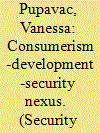

|
|
|
|
|
| Publication |
2010.
|
| Summary/Abstract |
Critics of global governance have been influenced by Foucault's analysis of modern total institutions disciplining both the mind and the body. However, Foucauldian biopolitics may present global governance too smoothly. This article takes critiques arguing that consumer capitalism's divorce from industrial production encourages romantic understandings of global problems and applies them to development aspects of the development-security nexus. It discusses three influential economists each of whose work is emblematic of consumer capitalism's international development vision at particular historical junctures. The article outlines how Rostow's The Stages of Economic Growth, arising during the postwar economic growth boom, envisages developing countries becoming consumer societies at the highest stage of development, but also anticipates consumer society's romantic critiques of modernity. It next examines Schumacher's Small Is Beautiful and his Buddhist economics, arising in the post-Bretton Woods crisis period, as symptomatic of re-emerging romantic critiques of society. Finally, it discusses Sen's human development approach as a market romance illustrating consumer capitalism's individual-orientated development strategies. The article concludes that the contemporary development romance addresses neither people's basic needs nor their aspirations, and it problematizes global governance's ability to secure and govern populations.
|
|
|
|
|
|
|
|
|
|
|
|
|
|
|
|
| 2 |
ID:
101482
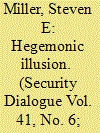

|
|
|
|
|
| Publication |
2010.
|
| Summary/Abstract |
At the heart of Buzan & Hansen's (2009) narrative is a conflict dynamic that pits traditional strategic studies, narrow and overly militarized but dominant, against a diverse set of challengers who aim to widen and deepen the field. Gradually, the challengers erode the hegemonic position of the traditionalists. This analysis reflects the assumptions, premises, and perceptions that Buzan & Hansen bring to this project as protagonists in the camp of the challengers. The present article offers a traditionalist response to this narrative, suggesting that the evolution of the field looks very different when viewed through the lens of traditional strategic studies.
|
|
|
|
|
|
|
|
|
|
|
|
|
|
|
|
| 3 |
ID:
101476


|
|
|
|
|
| Publication |
2010.
|
| Summary/Abstract |
Barry Buzan & Lene Hansen (2009) have filled an important gap in the literature by writing the first comprehensive survey of international security studies. While their work is systematically organized, their analytical framework could be strengthened by giving greater consideration to the complex interrelationships between theory and practices and by embedding theoretical constructs (and their inherently contradictory developments) within history.
|
|
|
|
|
|
|
|
|
|
|
|
|
|
|
|
| 4 |
ID:
101480


|
|
|
|
|
| Publication |
2010.
|
| Summary/Abstract |
This article suggests adding the category of public/private to Buzan & Hansen's (2009) account of the four central themes structuring security studies. By doing so, we can illuminate key parts of the field's analytic and political development, and better appreciate the challenges that it confronts in analysing new phenomena, including transnational non-state violence and security privatization.
|
|
|
|
|
|
|
|
|
|
|
|
|
|
|
|
| 5 |
ID:
101481


|
|
|
|
|
| Publication |
2010.
|
| Summary/Abstract |
Buzan & Hansen (2009) point to the role of historical claims in constituting disciplinary identities. Examining their intellectual history, this article evaluates how their use of an evolution metaphor establishes 'history' and how this history makes 'security' and 'security studies' intelligible. The article demonstrates that although Buzan & Hansen establish International Security Studies as being comprised of diverse theoretical approaches, they do so with a model of history that sanctions a realist conception of security. More broadly, Buzan & Hansen compel an exploration of the tensions between history and genealogy in security studies.
|
|
|
|
|
|
|
|
|
|
|
|
|
|
|
|
| 6 |
ID:
101477
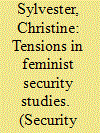

|
|
|
|
|
| Publication |
2010.
|
| Summary/Abstract |
Barry Buzan & Lene Hansen (2009) note that the first glimmer of concern with women and security within international relations and peace studies was a site of tension: in the 1970s and into the 1980s, women were not on the agenda of international relations at all. Peace theorists embraced the concept of structural violence but also excluded women from their discussions. There are now new inclusion/exclusion tensions within feminist international relations and its security wing. In this article I address two tensions: (1) concern to maintain the stance that security is a peace issue as some venture systematically into feminist war studies, and (2) a tendency to issue harsh judgements of feminists whose views challenge the accommodation of cultural difference. I briefly consider examples of these two tensions and suggest ways to work with and beyond the structure of international relations to 'evolve' (feminist) security studies further.
|
|
|
|
|
|
|
|
|
|
|
|
|
|
|
|
| 7 |
ID:
101478
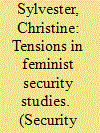

|
|
|
|
|
| Publication |
2010.
|
| Summary/Abstract |
Barry Buzan & Lene Hansen (2009) note that the first glimmer of concern with women and security within international relations and peace studies was a site of tension: in the 1970s and into the 1980s, women were not on the agenda of international relations at all. Peace theorists embraced the concept of structural violence but also excluded women from their discussions. There are now new inclusion/exclusion tensions within feminist international relations and its security wing. In this article I address two tensions: (1) concern to maintain the stance that security is a peace issue as some venture systematically into feminist war studies, and (2) a tendency to issue harsh judgements of feminists whose views challenge the accommodation of cultural difference. I briefly consider examples of these two tensions and suggest ways to work with and beyond the structure of international relations to 'evolve' (feminist) security studies further.
|
|
|
|
|
|
|
|
|
|
|
|
|
|
|
|
| 8 |
ID:
101485
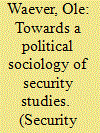

|
|
|
|
|
| Publication |
2010.
|
| Summary/Abstract |
Endowed now with a convincing history of itself, security studies needs a sociological analysis of its workings. The 'post-Kuhnian sociology of science' in the Buzan & Hansen (2009) volume is too sociologically thin and offers a disembodied history of ideas, not a sociology of flesh-and-blood scholars. This article suggests how a sociology of security studies can be strung between the two poles of a sociology of international relations and theories of expertise. Special attention must be paid to the role of 'security theory' for policy analysis, as well as the variation over time and geographically in the institutional chains connecting academe and policy, especially the changing nature of think-tanks. The centre of analysis should be networks of scholars manoeuvring these cross-pressures and making research and other career choices. Through its focus on form, this approach can explain dominant styles of scholarship in the USA and Europe as ways of meeting contrasting demands from academic institutions and policy relevance. The article ends with an assessment of the prospects for security studies.
|
|
|
|
|
|
|
|
|
|
|
|
|
|
|
|
| 9 |
ID:
101475


|
|
|
|
|
| Publication |
2010.
|
| Summary/Abstract |
This article examines the international networks of communication among journals concerned with international security studies. It uses the Web of Knowledge database on which journals cited articles in which other journals over the decade 1999-2008, and on the overall impact of each journal in the field as a whole. We discover a complex set of networks, with different central journals exerting influence both overall and within subnetworks, as well as peripheral journals linked weakly to only a few others. Some subnetworks can be distinguished by methodology or theoretical schools. Subnetworks frequently cross geographical lines, including both European and USA journals. No single journal dominates the field.
|
|
|
|
|
|
|
|
|
|
|
|
|
|
|
|